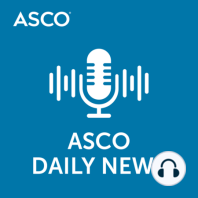25 min listen
ASCO23: Novel Therapies in Lung Cancer
FromASCO Daily News
ratings:
Length:
23 minutes
Released:
May 25, 2023
Format:
Podcast episode
Description
Drs. Vamsi Velcheti and Jack West discuss key abstracts in advanced SCLC and NSCLC, along with highlighting the largest known data set correlating ctDNA levels and efficacy outcomes in the EMPOWER-Lung 1 trial, in advance of the 2023 ASCO Annual Meeting. TRANSCRIPT Dr. Vamsidhar Velcheti: Hello, I am Dr. Vamsidhar Velcheti, your guest host of the ASCO Daily News Podcast today. I am a professor of medicine at NYU Grossman School of Medicine and the director of thoracic oncology at Perlmutter Cancer Center at NYU Langone Health. I am delighted to welcome Dr. Jack West, a thoracic oncologist and associate professor in medicine at the City of Hope Comprehensive Cancer Center. Today, we'll be discussing key posters and oral abstracts in lung cancer that will be featured at the 2023 ASCO Annual Meeting. Our full disclosures are available in the transcript of this episode and disclosures relating to all episodes of the podcast are available on our transcripts at asco.org/DNpod. Jack, it's great to have you on the podcast today. Dr. Jack West: Well, thank you so much, it's my pleasure to be here. Dr. Vamsidhar Velcheti: Let's begin with Abstract 8512. This is the follow-up of the Gronberg trial, the Danish trial of BID thoracic radiation for limited-stage small cell lung cancer. What are your key takeaways from this trial? Dr. Jack West: Well, as you noted, this has been presented before a few years ago. It's a trial for limited-stage small cell lung cancer and it directly compared chemotherapy with either 45 Gray or 60 Gray of chest radiation delivered twice daily. It's not an enormous study, it's 170 eligible patients. And years ago, we saw that the efficacy endpoints looked very promising for the patients who received a higher dose of 60 Gray on a BID schedule, which is above our standard. We generally either give 45 Gray BID or probably more commonly in the US and I think globally give maybe 60 Gray on a once-a-day schedule. But the efficacy looked quite promising and without any clear increase in the toxicity of it. And really, despite the impressive results, this hasn't changed practice. It is not a large study and I think that I would say that most of the radiation oncology world has been reserving judgment until potentially seeing a larger study. But what's being presented at ASCO are the longer-term results that continue to look excellent. You have a progression-free survival median of 18.6 months versus 10.9 months. That's not statistically significant but has a hazard ratio of 0.76 associated with it. And the median overall survival is even more pronounced of 43.5 months favoring the 60 Gray arm compared to 22.6 months in 45 Gray on a BID schedule that has a hazard ratio of 0.69. And this is statistically significant. The authors note that they will be presenting five-year overall survival as well. And there's also just passing mention that, as was seen previously, there was no increase in toxicity, no prohibitive toxicity. So I don't think it's necessarily going to change practice because the numbers of patients, which I think are really the leading concern, hasn't changed. But these very promising results still hold up over time and I think should compel us to carefully assess this as an option to potentially increase outcomes for this challenging setting where progress is slow to come. Dr. Vamsidhar Velcheti: Yeah, I completely agree, Jack. And I think one of the things that we have seen, at least in the non-small cell setting, like the higher dose of conventional radiation is not superior to the 45 Gray, BID dosing. I think there were some studies with CALGB and the Gronberg trial, but I think at the end of the day, it comes down to patient conveniencer. It's not often feasible for patients to come in twice a day for radiation. That might be something that might limit utilization here. Dr. Jack West: I think that's a very good point. It's just difficult when you have the potential
Released:
May 25, 2023
Format:
Podcast episode
Titles in the series (100)
Dr. Derek Raghavan Has a Remedy to Mitigate Financial Toxicity in Cancer Treatment: Transcript: Dr. John Sweetenham: Hello, I'm John Sweetenham, Associate Director of Clinical Affairs at UT Southwestern's Harold C. Simmons Comprehensive Cancer Center, and the guest host of ASCO Daily News Podcast today. I'm joined by my friend and... by ASCO Daily News
